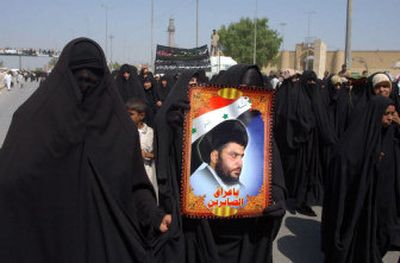Iraq constitution misses another deadline

BAGHDAD – As another deadline to complete a draft constitution passed Friday without definitive agreement among Iraq’s main factions, ruling Shiite Muslim parties said they would present a final version to the National Assembly this weekend with no further changes, even though it was rejected by several Sunni Arab leaders.
As some lawmakers said negotiations were continuing into the early hours today, and others claimed an accord had been reached that many Sunnis will endorse, government spokesman Laith Kubba told al-Arabiya television that “consensus is almost impossible at this point.”
“The draft should be put before the people,” he added, referring to the nationwide referendum on the document that must be held by Oct. 15. Many Sunni Arab leaders have urged their communities to vote against the constitution, which can be rejected if two-thirds of the voters in at least three of Iraq’s 18 provinces oppose it.
The completed document will be presented to the National Assembly today or Sunday, with or without Sunni backing, Humam Hamoudi, a Shiite who is chairman of the constitution-writing committee, told the Associated Press.
Also Friday, the U.S. military said it launched multiple air strikes with F-18 fighters against a house in the western town of Husaybah that local informants said was sheltering about 50 suspected insurgents. The number of casualties had not been determined, a military statement said.
The highly politicized process of writing Iraq’s charter revealed and reinforced deep divisions among Iraq’s Shiite and Sunni Arabs and ethnic Kurds, raising fears that disagreements could spiral into factional conflict. In an attempt to foster consensus, an Aug. 15 deadline for completing a draft was postponed by one week and subsequently extended twice more. Friday’s was the first deadline to pass without an official statement granting more time, as a news conference scheduled for just before midnight was canceled.
In recent days, President Bush, who along with other U.S. officials had urged Iraqi leaders to complete their work on time, personally intervened by telephoning Abdul Aziz Hakim, leader of the Shiites’ largest party, the Supreme Council for the Islamic Revolution in Iraq, to encourage conciliation with the Sunnis. U.S. and Iraqi officials have long maintained that inclusion of the Sunni Arabs, a once-dominant minority who now make up much of the violent insurgency, is a key to stability and eventual withdrawal of American troops.
In Washington, a senior State Department official involved in Iraq policy said: “What we’re witnessing is the endgame of this process. Events are moving in a positive direction. They’re continuing to work these issues, but they’re moving in the right direction.”
Deliberations bogged down Friday over two contentious issues as much about addressing Iraq’s troubled past as its future: whether and how to bar former members of Saddam Hussein’s Baath Party from political life, and the extent and method by which to devolve power from the federal government to autonomous regions that suffered greatly under Saddam’s rule.
Shiites said they offered to eliminate language outlawing the Baath Party, whose top officials were mostly Sunnis, while retaining a ban on its “Saddamist” branch and symbols.
On federalism, or the ability of Iraq’s provinces to form regional governments, Shiites said they proposed enshrining the principle of federalism in the constitution while leaving the details of how federal regions should be formed to future lawmakers. Some Shiites said they had agreed to have the constitution stipulate that no new regional governments be formed for at least two years.
“This is the last offer we have. We cannot go back anymore,” said Nabeel Mousawi, a member of the constitution committee from the ruling Shiite alliance.
Despite the dissenting voices, Kurdish and Shiite leaders said as broad an agreement as possible had been reached, and largely dismissed the objections of Sunnis who they said did not truly represent their communities.
“I think for all intents and purposes we have a deal. We have a draft that cannot be improved upon,” said Planning Minister Barham Salih, a Kurd. “No one could be entirely happy with what we have, but while some are opposed, many Sunnis expressed happiness.”
As factional leaders huddled in Baghdad’s fortified Green Zone for talks, large crowds took to the streets across the country Friday, a reminder that whatever the outcome of the protracted negotiations, the constitution’s fate lies with the people.
The largest demonstrations of the day were inspired by influential Shiite cleric Muqtada al-Sadr, who has yet to make public his opinion on the constitution, but whose stated opposition to federalism mirrors that of many Sunnis. About 20,000 followers of al-Sadr marched Friday in their stronghold of Sadr City, a sprawling slum in eastern Baghdad.